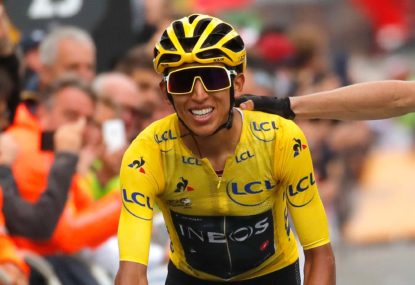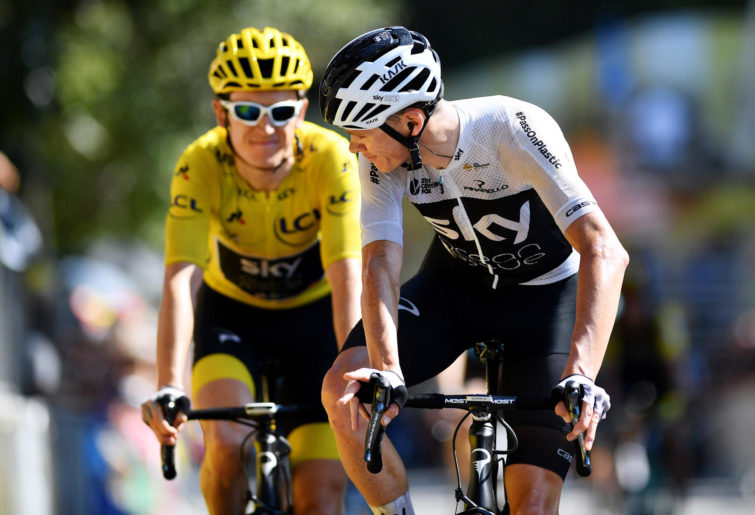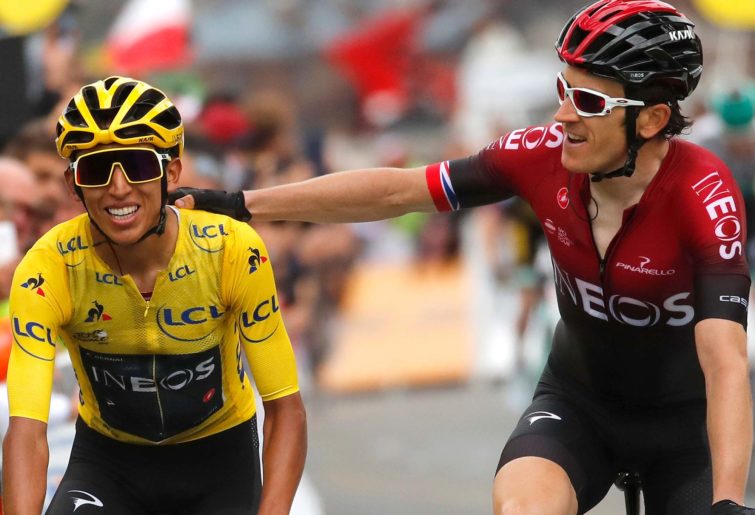'I've just won a stage of the Tour de France, mate!': Hindley grabs yellow jersey as Aussie blows Tour apart
Australia's Jai Hindley has said he is "lost for words" after a shock stage victory at the Tour de France earned him the leader's…

Every four years, I watch the Olympics, and every four years, I watch sports such as diving, swimming, and gymnastics, and question my life decisions.
I watch 16-year-olds twirl their way onto the podium. I watch 19-year-olds swim 100 metres faster than I could drive it.
But the sport of road cycling had so far held off these existential crises.
There may be young riders emerging into the peloton every year, but those at the top of the sport – those winning the monuments, the grand tours, and the world titles – are mostly safely into their late twenties, if not their thirties.
Chris Froome was already 28 when he won his first Tour de France title. Geraint Thomas and Bradley Wiggins were both 32 when they both wore the yellow jersey into Paris.

Christopher Froome and Geraint Thomas. (Photo by Justin Setterfield/Getty Images)
Even in the radioactive, EPO-fuelled peloton, the winners were older. Lance Armstrong was nearly 28 when he won the first of his seven redacted Tours.
This year, though, that has all changed. A young Colombian named Egan Bernal – already tipped for big things when he helped Thomas and Froome onto the Tour de France podium in 2018 – truly announced his arrival as one of the world’s best.
After placing fourth at his home race, the Tour Colombia, he won Paris-Nice, came third at the Volta a Catalunya, won the Tour de Suisse, and, despite going into the race as Team Ineos’ joint leader with defending champion Thomas, Bernal went on to win the Tour de France at just 22.
For context, he’s the youngest Tour winner since 1909, and the third-youngest ever.
But Bernal isn’t the only young rider ripping up the rulebook on how to rise through the professional ranks. This weekend Remco Evenepoel won the first World Tour one-day race he has ever ridden, when he powered away from the field at the Clasica de San Sebastian.
He has already impressed this season, winning the Tour of Belgium, and taking a slew of other good results in races such as the Tour of Turkey and the Adriatica Ionica.
Evenepoel is just 19.
There’s also Wout van Aert and Mathieu van der Poel. Both men may be a shade older than Bernal, and half a decade older than Evenepoel at 24, but have each dedicated most of their early careers to cyclo-cross.
This year, they took part in some of the road’s biggest races for the first time, and made their mark.
Van Aert finished on the podium at the E3 classic and Strade Bianche, with a strong sixth at Milan-San Remo. He won two stages and the points competition at the Criterium du Dauphine, rode to third in the Belgian national road race, and went on to beat the field in the national time trial.
He took his good form into the Tour de France and won a bunch sprint on Stage 10 in front of a shocked-looking Elia Viviani. Who knows what more he could have taken from the race had he not crashed out in the time trial?
Van der Poel may not have taken part in the Tour, but he rode one of the strongest spring classics campaigns, winning the Dwars door Vlaanderen, Brabantse Pijl, and the Amstel Gold Race. Add two fourth-place finishes at Gent-Wevelgem and the Tour of Flanders, all at the first time of asking, and it’s no surprise that people are already tipping him for greatness.
For all this promise, it’s important the media don’t overhype this new generation.
Cycling history may be littered with incredible performances at young ages from riders who went on to be generation-defining talents: Eddy Merckx won Milan-San Remo in 1966 when he was not even 21, while Bernard Hinault won Liege-Bastogne-Liege at just 22.
But it has also seen plenty of incredible performances from young riders who never went on to reach the same heights.
Jan Ullrich was 23 when he won the Tour, in 1997. He was expected to go on and win at least three or four, maybe even more, but he would never again stand on the top step of the podium in Paris.
Damiano Cunego was 22 when he won the Giro d’Italia in 2004. He still had a successful career after this, winning more than most professionals would dream of, but his early success was the peak.
I have seen tweets that, while tongue in cheek, speculate on how many Tours Egan Bernal will win. Five? Eight? Even ten?

Geraint Thomas congratulates Egan Bernal. (AP Photo/Christophe Ena)
They ask just how great Remco Evenepoel will be when he finishes growing, and on just how well Wout van Aert and Mathieu van der Poel will transition from cyclo-cross to road cycling.
But the important thing is not what they will achieve, but what they have achieved at such a young age. There is no point expecting each rider to define their era. The reason these cyclists are so remembered and revered is that they are so rare. For every Eddy Merckx or Bernard Hinault, there are dozens of others tipped to become world stars who don’t make it.
We must celebrate these incredible achievements by exciting young riders. It doesn’t matter what will come, they have all lit up 2019 in their own way.
Egan Bernal may never win the Tour again, but he’s won it once, and that will stand in the history books forever.